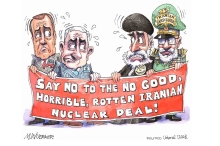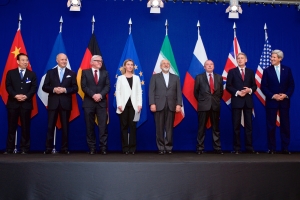
The #IranDeal: What Obama and Rouhani Have in Common
Reprinted from the CPD Blog by Sohaela Amiri (Aug 7, 2015)
The nuclear agreement that was reached between Iran and the world's major powers on July 14, 2015 has become a global discussion topic, but the most heated debates about it are taking place in the United States and in Iran. Hardliners on both sides have ramped up their efforts to sabotage the deal, while both governments are trying very hard to defend the deal and present it as a historical victory, which it truly is. The publicity that the Iran Deal debates has gotten has allowed both the Iranian and American governments to portray their countries as pragmatic, pro-diplomacy, and pro-peace—thereby enhancing their soft power, as opposed to repellently boasting about their hard power.
President Obama opened his speech at American University in D.C. on Wednesday (Aug 5), by admiring President Kennedy’s approach when he "rejected the prevailing attitude among some foreign-policy circles that equated security with a perpetual war footing. Instead, he promised strong, principled American leadership on behalf of what he called a practical and attainable peace, a peace based not on a sudden revolution in human nature, but on a gradual evolution in human institutions, on a series of concrete actions and effective agreements."
Obama reminded the audience of his own comments about the Iraq war: “America didn't just have to end that war. We had to end the mindset that got us there in the first place.” He also indirectly pointed out that the Unites States’ international image and legitimacy is still suffering from the Iraq war—a war that the vast majority of the world was against, but the U.S. lawmakers and the majority of Americans were thrilled to start.
Today, most of the world is celebrating the Iran Deal, as it cuts off Iran’s potential access to a nuclear bomb without starting another war. But many U.S. lawmakers are standing on the wrong side of history again, opposite the rest of the world. It is as if they are arrogantly oblivious to what goes on outside U.S. borders and how the U.S. will be judged as a result of their warmongering. Such ignorance is also prevalent among Iranian hardliners.
Like Obama, Rouhani also has to counter the narrative and actions of his country’s hardliners, and try to mend his country’s image which was destroyed by his predecessor. Extremist elements within the Iranian regime see this deal as an “existential threat” to their power. They call it “bad” and a shameful “appeasement.” They use any opportunity to point out that the U.S. is “evil” and should not be trusted. But aren’t these the exact same arguments we hear from the opponents of the deal in the U.S.? The hawks seem to share the same mentality no matter which side they’re on. They mirror each other. Their survival depends on crisis, unrest, and having an enemy to go to war with. Iran’s hardliners chant “Death to America,” U.S. hardliners chant “Bomb Iran Now”!
A movement called Delvāpasān, which roughly translates to "the concerned group," has gained momentum in Iran, and bears an uncanny resemblance to U.S. movements such as the #StopIranRally Coalition, Secure America Now, or Citizens for a Nuclear Free Iran. These are advocacy groups that at first glance look like grassroots organizations, but upon closer inspection their true nature is revealed: they are built on a foundation of money, and lots of it, that comes from ultra-hawkish right-wing lobbies.
Additionally, a number of online and offline advocacy campaigns initiated and financed by the governments of Israel and Saudi Arabia are trying to influence public opinion against this deal, both in the United States and in Iran. The ones in the U.S. push for military action against Iran. The ones in Iran push for uprising and unrest against the regime. The ultimate mutual goal of all this is clear: they seek Western-imposed regime change in Iran at all costs. They want another war in the Middle East. And they want the U.S. and Iranian publics to pay that cost.
As daunting as the opponents’ efforts are, it has been truly refreshing for the world to see two perceptive administrations in Washington and Tehran put forward an alternative narrative: instead of war threats and hate speeches, they managed to establish a dialog based on mutual respect. Based on recognizing the other side’s dignity, sovereignty, and security, despite having over three decades of conflicted history and mutual animosity. This is truly historic. Instead of honoring military generals, they showed the world that diplomats can be regarded as national heroes. That diplomacy can be the perfect alternative to war and an effective tool to resolve conflicts. They showed the world a level of maturity which has helped them win many previously lost hearts and minds around the globe, winning a newfound respect for their administrations, and of course for diplomats such as Kerry and Zarif.
Obama will forever be loved by the Iranian people because of this deal. And Rouhani is perhaps the first president of the Islamic Republic of Iran so far who has been portrayed rather positively in the American media. That’s a good start!
Issue Contents
- Introduction
- A Tale of Two Speeches: American Identity and Diplomacy
- Economic Sanctions as Temper Tantrums
- The U.S.’ Image Among Shia Muslims
- Lessons From the Past: U.S.-Iran Public Diplomacy
- When Congress Toys with Foreign Policy
- Israel, Public Diplomacy, and the Iran Agreement
- The #IranDeal: What Obama and Rouhani Have in Common
- America and Iran: Following Up with Public Diplomacy
- PD News Stories Related to the #IranDeal
Most Read CPD Blogs
-
August 2
-
July 5
-
July 19
-
July 3
-
August 12
Visit CPD's Online Library
Explore CPD's vast online database featuring the latest books, articles, speeches and information on international organizations dedicated to public diplomacy.









Add comment